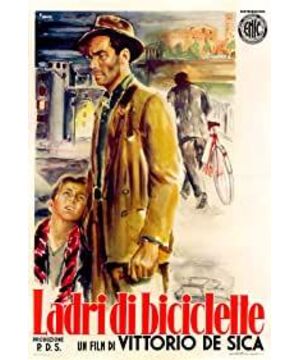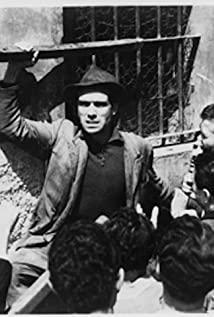The movie "Bicycle Thief" should be the "dark times" in Italy since modern times. After the end of World War II, Italy was left with a bleak reality, the most prominent of which was unemployment. The film's owner, Kiki, had to wait several months at an employment agency in order to find a job posting posters.
Following the protagonist's bike-hunting journey, we can also appreciate the Italian style of the time: unemployed everywhere, accompanied by frequent petty thefts and even organized crime. In the film, we see that a group of four people clearly stole Ritchie's bicycle; when Ritchie found the thief himself, his neighbors also came to help out. Even, the living conditions of the thief's family are worse than that of Richie, who has been unemployed for a long time. This is the truest side of post-war Italy.
Statistics after the end of the war show that after the end of World War II, Italy's industrial equipment was severely damaged, 1/3 of its national wealth was destroyed, industrial production and national income fell by more than 50%, and tens of millions of people lost their jobs. After surrendering to the Allies in 1943, a large part of the Italian nationals required even Allied rations. By 1946, the United Nations Relief Service had provided Italy with food, fuel and other necessities worth about $450 million.
The subsequent war reparations further dragged down the pace of Italy's development. According to the "Paris Agreement" signed in 1947, Italy needed to pay $100 million to the Soviet Union, $5 million to Albania, $105 million to Greece, and $1.25 to Yugoslavia. $25 million in compensation to Ethiopia. This further leads to the outflow of funds that could have been used for production and cannot be used to develop the national economy.
However, in "The Car Stealer", the director not only showed us the difficult life of the Italian people at the time, but also arranged a heartwarming ending for the film. In order to keep his job, Richie desperately tries to steal someone else's bike, only to be caught. At this time, the son Bruno played the role of protector, so that the bicycle owner would not be held accountable, and finally the father and son left hand in hand. After all, as long as you live, there is always hope.
After the war, Italy finally embraced the thigh of the United States. While following the United States diplomatically, it also received a lot of assistance from the Marshall Plan. In the years from 1948 to 1952, when the Marshall Plan was implemented, Italy received US$1.47 billion in aid from the United States, equivalent to about 11% of the total aid funds of the Marshall Plan. In addition, the liberal economic system learned from the United States has also changed the closed "self-sufficiency" economic policy of the Mussolini era, stimulating domestic economic vitality.
The Korean War that broke out in 1951 was not only the beginning of Japan's rapid growth, but also the beginning of Italy's rapid growth. The great demand for materials from the war further stimulated Italy's export-oriented economy. From 1951 to 1963, the Italian economy ushered in a period of rapid growth.
This period is also known as the "Italian Economic Miracle", in which the contribution of SMEs dominates. Especially in the textile, food, furniture and other industries, small and medium-sized enterprises account for the vast majority. While stimulating the economy, they also absorb a large number of labor. However, these small and medium-sized enterprises are not very interested in innovation, mergers, and development into large enterprises, but are more concerned about allowing the government to suppress wages and maintain low labor costs.
With the advancement of globalization, low-end industries have gradually shifted to Asia where labor costs are lower. This has led to a reduction in the competitiveness of Italian domestic industrial products. In this context, a large number of small and medium-sized enterprises with low anti-risk capabilities have closed down one after another, and a large number of workers have lost their jobs. In 1988, half of all men aged 14-29 in southern Italy were looking for work. Unemployment rates are higher among young women.
So far, the "three mountains" of Italian society have basically formed, namely the split between the north and the south, the solidification of classes, and the general unemployment. In order to maintain social stability, the Italian government was forced to adopt a policy of high welfare to appease the domestic unemployed. But the welfare system requires a lot of social wealth, so the state has to rely on tax hikes and borrowing to maintain the situation. In fact, looking at southern European countries like Greece, Spain, and Portugal, similar problems are all "elephant in the room".
However, tax hikes will increase the operating costs of companies and reduce their profit margins. In difficult times, it is easy to trigger a wave of closures, resulting in larger-scale unemployment; and borrowing is not a long-term solution, especially in the event of financial turmoil, which is easy to trigger Domestic unrest. For example, in 2018, Italy's public debt accounted for 134.8% of its annual GDP, making it one of the ridiculed "European pig five countries". In the entire "European Pig Five Countries", southern Europe alone occupies four seats. Among the four countries, the unemployment rate remains high, and it is especially difficult for young people to find jobs.
According to 2013 figures, youth unemployment in Greece and Spain is over 55%, while in Italy and Portugal it is closer to 40%. Severe youth unemployment is creating a "lost generation" in southern Europe, leading to a brain drain that will ultimately pose a fundamental threat to the social welfare system itself.
If in the movie "The Bicycle Thief", most of the unemployed are the heads of the family; then in today's Italy, young people are more likely to be victims of unemployment. Structural issues are the real driving force behind youth unemployment. Compared with Germany's "dual-track education system", which allows students to study and find employment, it is difficult for southern European countries to help students complete the transition from campus to employment.
In addition, the welfare system originally designed to protect the interests of the people will also become an obstacle for young people to find jobs in reality. In companies in Greece, Spain, Portugal and Italy, it is very difficult to fire an employee with a long-term contract, so when a new employee comes in, companies tend to sign a temporary contract. And when the economic crisis hit, these people were naturally the first to be laid off because they were "lost to protect the car".
Under the crisis, there are not many choices left for young people. Some young people choose to go outside and seek opportunities abroad where there are more job opportunities, and this "brain drain" will have a long-term and far-reaching impact on the entire national economy. Or, some young people choose to "eat the old" with peace of mind. According to statistics from the Italian National Bureau of Statistics, by the end of 2012, nearly 7 million Italian young people still lived with their parents, accounting for 61.2% of the unmarried population under the age of 35.
Compared with countries such as the United Kingdom and the United States, southern European societies place more emphasis on the family's duty of care to members. When the head of the family loses his job, then his relatives are obliged to provide financial assistance - as we saw in "The Bicycle Thief", the protagonist redeems his bicycle by relying on his mother-in-law's dowry sheets; and when young people lose their jobs, he Not only are they allowed to live at home, but they can also get some living expenses. In addition, they can work part-time jobs around their parents' house to earn some pocket money. It is also because some people "backed up" behind their backs that the unemployment rate of these young people in southern Europe is particularly high, and the duration of unemployment will be particularly long.
View more about Bicycle Thieves reviews











